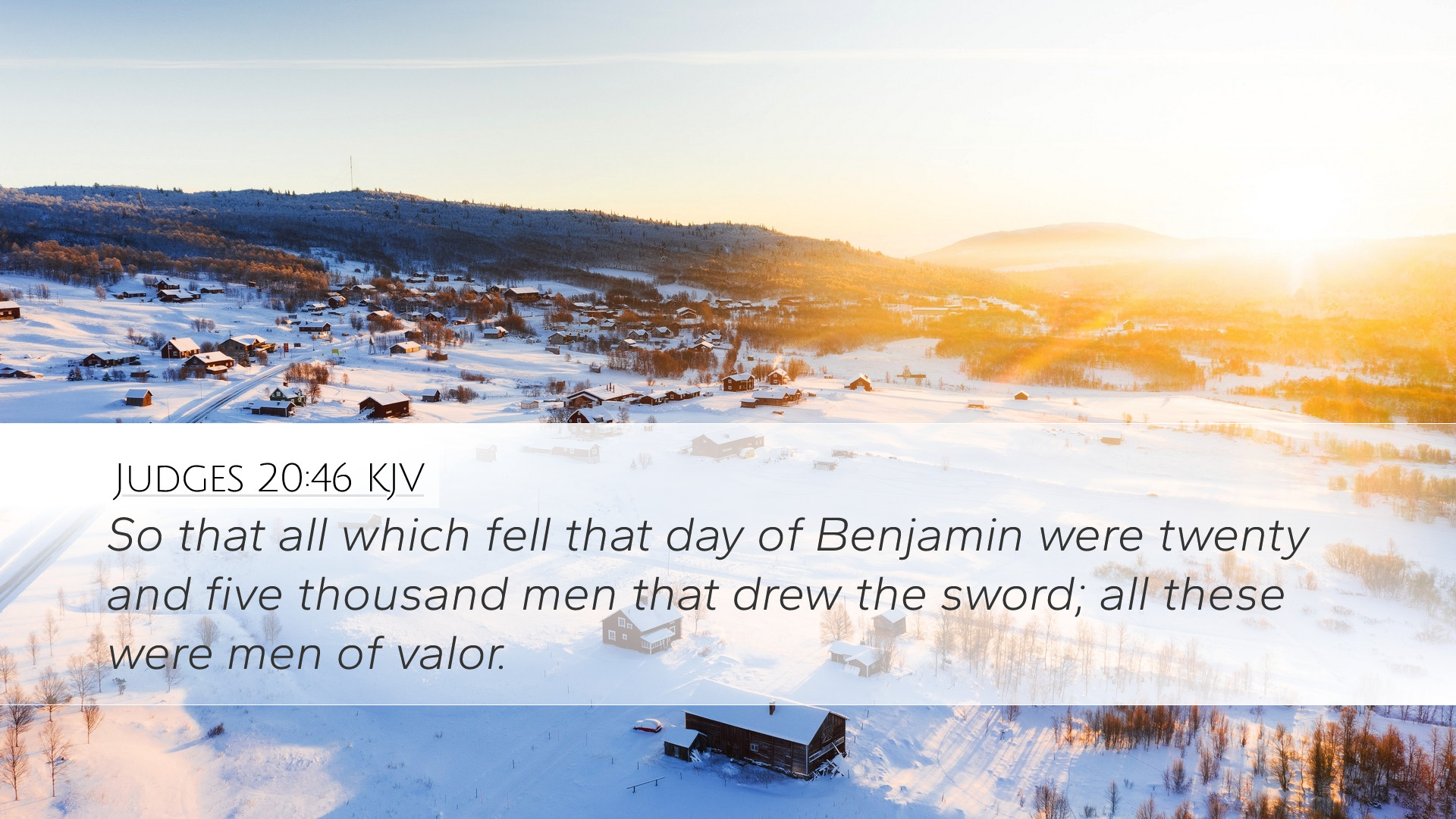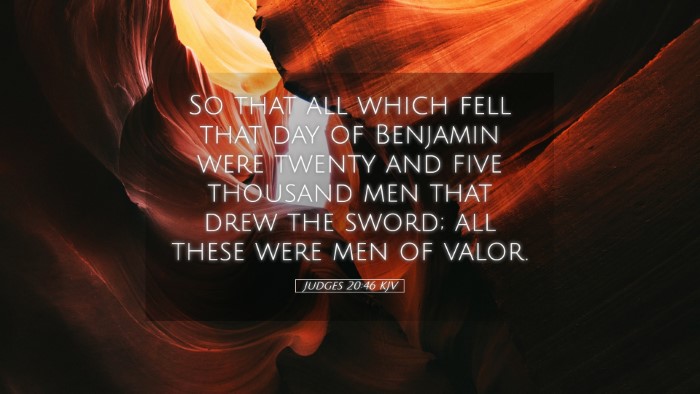Bible Commentary on Judges 20:46
Verse Context: Judges 20:46 states, "So that all who fell that day of Benjamin were twenty-five thousand men that drew the sword; all these were men of valour." This verse comes at the conclusion of a tragic civil conflict in Israel where the tribe of Benjamin faced severe consequences for their actions.
Overview of the Civil Conflict
The conflict described in the Book of Judges illustrates a period of great moral decline in Israel, characterized by a lack of centralized authority and rampant immorality. The account preceding Judges 20 reveals how the wickedness of a few can lead to significant suffering for many.
Analysis of Judges 20:46
This verse serves as a grim conclusion to Israel's war against the tribe of Benjamin. It highlights the devastating outcome of civil strife, where brother turns against brother. The number of fallen — 25,000 brave men — underscores the tragedy of the conflict. Each of these men were valiant, possibly referring to their warrior status rather than their moral standing.
Commentary Insights
- Matthew Henry: Henry notes the severity of the judgment upon Benjamin and the sorrow that accompanies it. Despite their bravery, the loss of life signifies the moral decay that has overtaken Israel. This conflict serves as a warning about the consequences of sin within the community, emphasizing the ramifications of collective rebellion against God.
- Albert Barnes: Barnes focuses on the military aspect, recognizing that Benjamin's fighters were indeed men of valor. He reflects on the tragedy that, despite their bravery, they were ultimately defeated due to their allegiance to sin. Barnes emphasizes the importance of alignment with God's will rather than mere personal valor.
- Adam Clarke: Clarke expands on the narrative by discussing the broader implications of this conflict. He points out that the battle against Benjamin is symbolic of the struggles that face any community when sin and injustice are allowed to prevail. Clarke argues that true valor is not merely in physical combat but is found in fidelity to God and righteousness.
Theological Implications
The events leading to Judges 20:46 highlight several theological truths relevant to contemporary readers:
- The Nature of Sin: The sin of Gibeah and the subsequent actions of the tribe of Benjamin demonstrate how individual rebellion can lead to collective disaster.
- The Role of Judgment: God’s judgment, though painful, serves a purpose in restoring righteousness. The defeat of Benjamin can be seen as a necessary but sorrowful process for the overall health of the nation of Israel.
- The Cost of Civil Strife: The high toll of 25,000 lives leads to reflection on the tragic outcomes of conflict. Communities must prioritize reconciliation and godliness, as divisions can be devastating.
- Valour vs. Virtue: The distinction between being a man of valor (skill in warfare) and a man of virtue (moral character) is profound. One must question whether military success can ever justify wrongdoing.
Application for Today's Readers
Pastors, students, and theologians can draw significant lessons from Judges 20:46:
- Caution Against Division: Much like the Israelites, today’s communities face divisive issues that threaten unity. It is crucial to pursue peace and reconciliation.
- Promote Righteousness: Leaders are called to encourage righteousness and justice as foundations of community life, reminding followers that valor without virtue is hollow.
- Embrace Accountability: The tribe of Benjamin faced the consequences of their sin actions. Communities must foster environments where accountability to God’s moral standards is upheld.
- Learn from History: The account serves as a historical reminder that neglecting God’s commandments can lead societies into turmoil. Continuous reflection on scriptural teachings is essential.
Conclusion
Judges 20:46 ultimately depicts a somber reality of moral failure and its consequences. The loss of life among the men of Benjamin is a stark reminder of the cost of sin and the importance of righteousness in community relationships. As we reflect on this passage, let it inspire us to pursue justice and peace in our communities, remembering always the weight of our moral choices.


